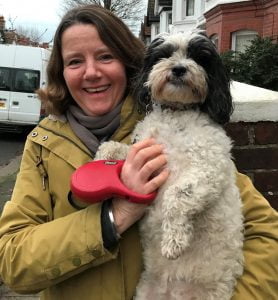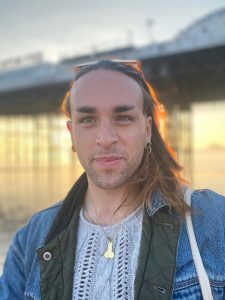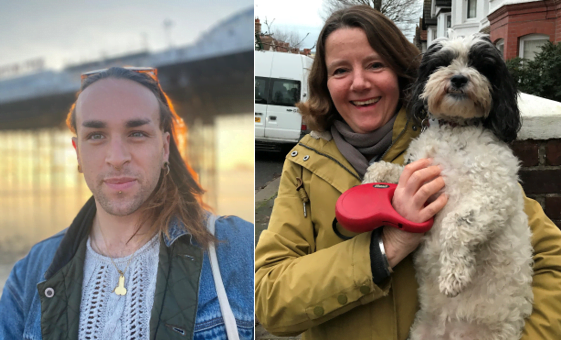Faith and Queerness: a discussion between colleagues. PRIDE month has given our organisation an opportunity to explore the lived experiences of both our LGBTQU+ staff and the young people we work with. One of the issues raised by Joshua Pemberton, our Support and Advice Team Leader at Brighton’s Youth Advice Centre, is the sometimes difficult relationship between religion/faith and people in the LGBTQU+ community. How does ‘queerness’ or other LBGTQU+ identity fit with faiths that can be rejecting?
Joshua reached out to Lucy McGrath, our Lead Chaplain, to discuss it and what follows is their very open and honest conversation. To be clear Lucy is answering and representing the view of our Chaplaincy work, rather than talking on behalf of any one faith group.
Lucy’s questions for Joshua
Lucy: You got in touch with me during this Pride month asking if I would write an article about Queerness and Faith, can you say why you think it is important to discuss this?
Joshua: When I approached you for this article, I had recently been called out by a friend on some hypocritical points of view and was challenged about my genuine approach to intersectionality and being open to other’s beliefs.
Anyone who knows me would know that I was quite shocked, being a person who regularly stands on my soap box to discuss intersectionality, inclusive practice and LGBTQU+ rights, I realized that while I had strong opinions and validation to support my perspective, I had missed something in my own understanding of faith.
As my friend pointed out to me, faith is about accepting love, being open to the belief in something greater than ourselves and using that faith to support and teach others.
My experience of faith had been something very different. I had seen faith used against me and my community to prove that my existence and place in this world was wrong or unwanted. I went to a religious school and felt very oppressed by the teachings, and it wasn’t until recently having conversations with straight-cis people who are religious and who love me, did I see that even if I don’t pray to a god, God’s love still touches me through the people I love.
As a queer person, I am constantly asking others to be more open to the experience of others and listening to that, rather than pre-conceived ideas about gender, sexuality, gender identity. However, I realised in my fight for what I consider my rights, I had stopped myself being open to the views and beliefs of others, writing off faith as something I had nothing to learn from.
I started to research into faith and queerness, and while Christianity came up, it seemed that Islam, BIPOC and Queer people of faith from other religions had more published experiences of lack of acceptance and dealing with the struggle between faith and queerness.
I felt that as an organisation that spans multiple intersections of people’s lives – young people, mental health, faith etc, we should be asking ourselves how we approach faith and queerness and what we can do to support those communities.
Lucy: When you applied for your role at YMCA did the ‘C’ (Christianity) part of YMCA raise any questions for you?
Joshua: I think it made me nervous. I have been keen not represent myself in anyway religious and have atheist views in general. I saw YMCA as, Youth Minded Community Approach. However, as I have worked with the organisation and seen young people use the chaplaincy, I’ve realised that religion at its core is never the issue, just how we chose to use and navigate it. If we are open and honest and see faith as a way of passing a message of love, it has a place in all our lives, and can be used as a huge source of strength and support for all people.
Lucy: What more can we all do, including me as a chaplain and all our chaplains, to help all those who identify as LGBTQ+ to feel a sense of belonging and acceptance, particularly the young people we support?
Joshua: My belief is around advocacy and empowerment. Nobody has all knowledge, we need to consistently use our positions, our privilege, or any space we occupy to promote the voices in the room we cannot see or hear. If we look around in a room and think, who is missing from this conversation, who is not being heard, what can this person offer, and work hard to bring them in, have the opinions and needs met, then we are giving the opportunity for people to belong and accepted. The world works by hoarding all resources at the top of the pyramid, but this will always leave a marginalised base left to support the hierarchy, we need to challenge this – in faith, in organisations, in ourselves. Religious / faith figures – Jesus / Buddha – by making their greatest sacrifices gained the highest level of self-actualisation.
Joshua’s questions for Lucy
Joshua: How can Christianity be used as a mechanism to support LGBTQU+ people in our society?
Lucy: I love the positivity of this question, especially given that many LGBTQU+ people have experienced huge damage and hurt through the Christian church, for example, through conversion therapy and more subtle methods like offering spiritual guidance and prayer aimed at changing people, rather than loving them as they are.
I can’t speak for all Christians but I think the way Christianity can be used to support people is if we go back to Jesus’ teachings and example. Jesus extended his love not to one group over another but to all. Jesus often hung out with those who were marginalised by society – and he spoke out against oppression. So many people have experienced rejection and persecution because of their sexuality or gender identity. I think that breaks Jesus’ heart. One of my favourite psalms (139) in the bible talks about how we are all “Fearfully and wonderfully made”. I strongly believe God wants us to know we are loved just as we are –however we identify in terms of gender and sexuality. But Jesus also talks a lot about justice – so as Christians I believe we are called to be his hands, feet, ears and mouth in the world – to speak up against oppression where we see it and to do everything we can to ensure all among us who identify as LGBTQU+/queer feel accepted and proud of who they/we are.
I know there are people within the church with different views and sometimes this has caused divisions within the church. Recently (Nov 2020) after 3 years work the church of England produced a series of resources called ‘Living in Love and Faith’ looking at some of these issues.
Joshua: How does YMCADLG Chaplaincy support LGBTQU+ / Queer people in our organisation?
Lucy: Good question, and it makes me wonder what more we could and should be doing. One very practical thing we do is when we recruit volunteer Chaplains we ask them all a question aimed at teasing out from them any attitudes we believe could be anything other than helpful to LGBTQU+ young people who live in our housing projects. I have met several young people whose confidence has been knocked and who have experienced rejection as a result of their sexuality and identity, and we want a team of volunteer Chaplains whose attitude is one of love and acceptance, so that young people can come along to chaplaincy sessions and experience a safe space where they are able to be themselves. Essentially, we want volunteers who transmit the message that someone is infinitely precious just as they are. I do remember one young man who was transitioning and who spoke at length over many months to the chaplains about what he was going through.
One of the things I am most proud of was a volunteer Chaplain who came to accept her own sexuality through her experience as a volunteer with us. She was on a team with a Chaplain who identified as gay and one who identified as bisexual, and she worked with many LGBTQU+ young people. This is what she wrote:
“I have lived in Brighton for 8 years and only became a “proper going-to church Christian” 5 years ago. In that time I have struggled a little with being someone with a faith in God and being open about my sexuality.
Through the wonderful wisdom and honesty of some of the young residents and the support and acceptance from staff and my fellow chaplains, I now believe that it is possible to be both. I have gained so much more than I have given through volunteering for YMCA.
Joshua: What would you say to someone who told you it was not Christian to be LGBTQU+?
Lucy: I would feel sad and angry if someone said that to me. That view feels so far from how I see God’s love. I would try to listen to their views and understand how they came to that belief (God loves us all after all) but I would also challenge them based on my own faith and beliefs, and my experience of God.
———-
We would like to say a huge thank you to both Lucy and Joshua for taking the time to explore this subject and bring into the open some of the difficult issues that arise.
Further reading on LGBTQU+ identities, religion and faith
Below are some suggestions for further reading for anyone looking to go into more depth:
- Church of England: ‘Living in Love and Faith’
- Stonewall: Resources for LGBTQU+ people of faith
- Gay Pride Bookshop: LGBTQU+ Spirituality & Religion
Biographies:
Lucy McGrath (Pronouns she/her)

Lucy has been Lead Chaplain for YMCA DownsLink Group since 2016. Her role involves working with a wonderful team of paid and volunteer chaplains to support young people who live in YMCA DownsLink Group housing projects, both 1-1 and through weekly chaplaincy sessions (which almost always involve food 😉). As a team they also: offer prayer/reflection spaces; organise celebrations and services for particular occasions; work to involve local communities and faith/church groups; offer 1-1 support to staff and offer crisis support. They also have a role as the ‘conscience’ of the organisation – helping ensure it lives out it’s values. Lucy is pictured with her dog, Heidi, who is an honorary Chaplain.
Joshua Pemberton (Pronouns: Please Use My Name / They:Them)

Joshua works as a Team Leader for the Youth Advice Centre in Brighton, managing the generalised Support and Advice Team, developed for 13-25 year olds, supporting with mental health, sexual health, emotional well-being, anger management; skills, education and employment support, LGBTQU+ specialist advice and signposting and referrals.
Joshua has ten years’ experience working with young people, with specific focus on inclusive practice, achieving multiple accreditations and awards within the charity sector for equal and inclusive practice in youth work. In addition, Joshua has a Masters in Sexual Dissidence, enabling them to use expertise in queer theory, sexuality and gender studies, to understand and analyse societal systems to promote intersectionality, inclusion and equitable practice for marginalised communities within oppressive systems. This offers them a unique and interesting insight into how intersectionality can impact young people’s experiences of services, and how we can improve and develop practice for a more intersectional approach.

